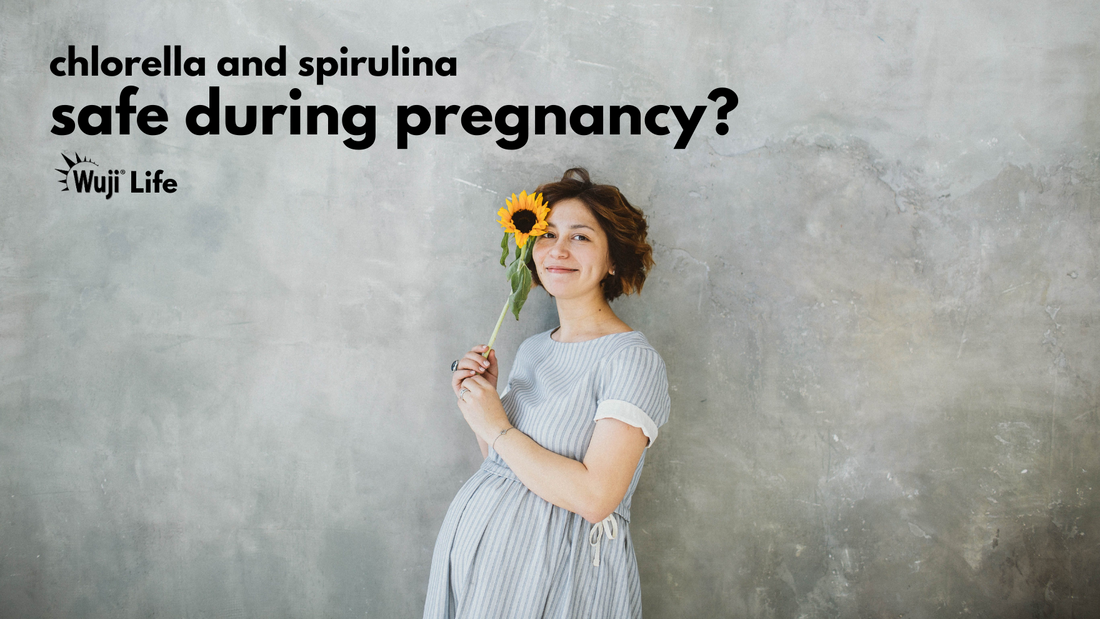"Can any mommy say how they took Chlorella before, during and after pregnancy? And what benefits were noticed?"
This is a great question! We have moms at Wuji and customers who consumed Chlorella before, during, and continued after pregnancy. Here is a personal experience from one of our customers:
"I am personally a new mom of a 3 and a 1.5 year old. In my experience, I consumed Chlorella tablets with water (for the convenience), before, throughout both pregnancies, and after. Chlorella during both my pregnancies was amazing. I rarely experienced any of the usual constipation symptoms that typically occur during pregnancies. Compared to many of my mommy friends, who were also pregnant around the same time, I hardly got sick or had any cold like symptoms. After pregnancy, I still take Chlorella and I even offer Chlorella & Spirulina Water (I use the powder in their water) to my kiddos daily.
For me, I notice a tremendous difference between my little ones and other kids in their ability to eliminate through their bowel movements as well as rarely, if ever, experiencing constipation. I know that this has been key to their health and well-being and I credit this to Chlorella. In comparison to other littles, my children have had fewer instances of illnesses and have recovered quicker than most when they were exposed to hand foot and mouth, ear drum rupture, colds, coughs etc!" (Susan M.,)
Recent studies highlight several potential benefits of Chlorella and Spirulina for pregnancy and breastfeeding, primarily due to their rich nutrient profiles, including essential vitamins, minerals, and antioxidants. Here are some key findings:
1. Chlorella and Pregnancy
- Reduction of Anemia and Edema: A study published in Plant Foods for Human Nutrition found that pregnant women who took Chlorella supplements had a significantly lower incidence of anemia and edema (fluid retention), common issues during pregnancy. Chlorella's high iron content and folate levels may contribute to these benefits.
- Detoxifying Heavy Metals: Chlorella has been shown to help detoxify heavy metals from the body, which can be particularly beneficial during pregnancy to ensure a healthier environment for fetal development.
- Boost in Antioxidants: Chlorella is rich in chlorophyll and other antioxidants that can support a healthy immune response, reducing oxidative stress that might otherwise impact maternal health and fetal development.
2. Spirulina and Pregnancy
- Protein and Nutrient-Rich: Spirulina is a complete protein source, making it a valuable supplement for expectant mothers who need increased protein intake. It also contains important micronutrients like B vitamins, iron, and magnesium, which support energy production and healthy fetal growth.
- Enhanced Immune Support: Spirulina’s antioxidant and anti-inflammatory properties, due to compounds like phycocyanin, have been shown to enhance immune function, which may help pregnant women avoid infections or reduce inflammation during pregnancy.
- Folate and Iron: Adequate folate and iron are essential for preventing birth defects and anemia. Spirulina offers bioavailable forms of these nutrients, making it a useful natural supplement during pregnancy.
3. Benefits for Breastfeeding
- Increased Milk Production: Though specific human studies are limited, anecdotal evidence suggests that Chlorella and Spirulina may enhance milk production due to their nutrient density and the presence of galactagogues, substances that promote lactation.
- Rich in Essential Fatty Acids: Spirulina contains gamma-linolenic acid (GLA), a type of omega-6 fatty acid that supports healthy lactation and breast milk quality, providing essential fats for both the mother and baby.
- Boosting Nutrient Profile of Breast Milk: Chlorella can increase the levels of carotenoids, chlorophyll, and other micronutrients in breast milk, potentially supporting the infant's immune system and overall development.
4. Detoxification and Heavy Metal Protection
- Both Chlorella and Spirulina have been shown to bind to heavy metals and toxins in the body, potentially reducing exposure for both the mother and the baby, especially when breastfeeding. This detoxifying effect might support a cleaner, more nutrient-rich milk supply.
5. Supporting Postpartum Recovery
- Mood and Energy: The B vitamins in Spirulina are known to support mood regulation and energy levels, which can help mothers during the postpartum period. This may be particularly beneficial for combating postpartum depression and fatigue.
- Anti-inflammatory Properties: Both Chlorella and Spirulina have strong anti-inflammatory effects, which may assist in reducing inflammation and promoting faster recovery after childbirth.
__________________________________
SPECIFIC STUDIES
Chlorella supplementation decreases dioxin and increases immunoglobulin a concentrations in breast milk
Studies in Japan found that supplementation with Chlorella pyrenoidosa (Sun Chlorella A tablets, Sun Chlorella Corp., Kyoto, Japan) during pregnancy decreased the amount of dioxins and increased the concentration of immunoglobulin A in breastmilk.[1,2]
Ten healthy women took 2 grams of dried Chlorella powder in a tablet formulation (Biorinck, Chlorella Industry Co. Ltd.) after each of 3 main meals of the day, beginning at 16 to 20 weeks of pregnancy and continuing until delivery. Tablets contained lutein 270 mg, beta-carotene 90 mg, zeaxanthin 30 mg, alpha-carotene 7 mg, vitamin K1 (phylloquinone, phytonadione) 3 mg, and chlorophylls 3.2 grams per 100 grams, in addition to numerous vitamins and minerals. Compared to 10 pregnant women who took no Chlorella, the breastmilk of the treated women contained significantly more beta-carotene (1.7-fold higher) and lutein (2.7-fold higher), zeaxanthin (2.6-fold higher) in the first 6 days postpartum. No differences were found in the breastmilk content of beta-cryptoxanthin, alpha-carotene, or lycopene between groups.[3]
Three days before delivery, a mother replaced her normal iron supplement with blue-green algae complex (blue-green algae, Chlorella, and spirulina; Ambrosia-SupHerb Ltd., Israel) 750 mg once daily. On the second day after delivery she expressed 30 mL of dark green milk. No abnormal milk cytology was found and a microbiologic culture was negative. After stopping the supplement, her milk returned to a normal color over the next 3 days. The change in color was probably caused by the algae supplement.[4]
Effect of maternal Chlorella supplementation on carotenoid concentration in breast milk at early lactation
Breast milk carotenoids provide neonates with a source of vitamin A and potentially, oxidative stress protection and other health benefits. Chlorella, which has high levels of carotenoids such as lutein, zeaxanthin and β-carotene, is an effective dietary source of carotenoids for humans. In this study, the effect of maternal supplementation with Chlorella on carotenoid levels in breast milk at early lactation was investigated. Ten healthy, pregnant women received 6 g of Chlorella daily from gestational week 16-20 until the day of delivery (Chlorella group); ten others did not (control group). Among the carotenoids detected in breast milk, lutein, zeaxanthin and β-carotene concentrations in the Chlorella group were 2.6-fold (p = 0.001), 2.7-fold (p = 0.001) and 1.7-fold (p = 0.049) higher, respectively, than those in the control group. Our study shows that Chlorella intake during pregnancy is effective in improving the carotenoid status of breast milk at early lactation.
Chlorella pyrenoidosa supplementation reduces the risk of anemia, proteinuria and edema in pregnant women
Pregnancy anemia and pregnancy-induced hypertension (PIH) are common and potentially dangerous disorder in human pregnancy, and nutritional status of pregnant women is one of the leading causes. Chlorella contains large quantities of folate, vitamin B-12 and iron, and can help improve anemia and hypertensive disorder. Our objective was to investigate the preventive effects of Chlorella supplement on pregnancy anemia and PIH in Japanese pregnant women. A total of 70 pregnant women were placed into the control group (n = 38) or the Chlorella group (n = 32). The subjects in the Chlorella group were supplemented daily from 12th-18th wk of gestation until delivery with 6 g of Chlorella supplement. The proportion of anemic (hemoglobin level < 11 g/dL) subjects in the Chlorella group were significantly lower compared with the control group at the second and third trimesters. Additionally, in the Chlorella group, the incidences of proteinuria and edema, signs of PIH, were significantly lower during the third trimester. These results suggest that Chlorella supplementation significantly reduces the risk of pregnancy associated anemia, proteinuria and edema. Chlorella supplement may be useful as a resource of natural folate, vitamin B-12 and iron for pregnant women.
Maternal-fetal distribution and transfer of dioxins in pregnant women in Japan, and attempts to reduce maternal transfer with Chlorella (Chlorella pyrenoidosa) supplements
Dioxins can be transferred from mother to fetus via the placenta, or to nursing infants via breast milk, potentially causing developmental health problems in children. To assess pediatric health risks from dioxins, exposure of mothers and children to dioxins must be clarified. Methods of reducing maternal transfer of dioxins should also be investigated. Concentrations of 28 dioxin (polychlorinated dibenzo-p-dioxins, polychlorinated dibenzofurans, and co-planar polychlorinated biphenyls) congeners in blood, adipose tissue, breast milk, cord blood and placenta collected from 44 pregnant Japanese women were measured. In addition, to investigate potential reductions in maternal transfer of dioxins, 23 pregnant women were instructed to take Chlorella pyrenoidosa supplements during pregnancy. Correlations were observed between dioxin total toxic equivalents (total TEQ) in blood and total TEQ in adipose tissue (r=0.913, P<0.0001), breast milk (r=0.695, P=0.0007), and cord blood (r=0.759, P<0.0001). Dioxin levels transferred to fetuses and nursing infants reflect cumulative maternal concentrations of dioxins. A linear regression equation was introduced to predict total TEQ in breast milk and cord blood from dioxin levels in maternal blood, which should prove useful in evaluating fetal and infant risk of dioxin exposure. Total TEQ in cord blood were approximately 26% lower than in maternal blood (P<0.0001). The results of this study suggest that transplacental transfer differs depending on the dioxin congener. Total TEQ in breast milk were approximately 30% lower in the Chlorella group than in controls (P=0.0113). This finding suggests that maternal transfer of dioxins can be reduced using dietary measures such as Chlorella supplements

